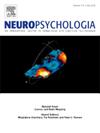Prosodic intonation modulates semantic incongruence: Evidence from an electrophysiological study
IF 2
3区 心理学
Q3 BEHAVIORAL SCIENCES
引用次数: 0
Abstract
People always make semantic predictions based on preceding contexts which, however, can be beyond semantic information. This study examines the role of prosodic intonation as a non-semantic cue in semantic prediction. To compare effects of different intonation conditions on attenuating semantic incongruence between preceding contexts and target utterances, we recorded electroencephalogram when the participants listened to emotional utterances with congruent or incongruent endings and focused on two event-related potential components, N400 and P600, which relate to semantic and pragmatic processing, respectively. Interestingly, we observed that surprising intonation can mitigate the N400 in response to semantic incongruence, and this modulation was strongly correlated (r = 0.78) with the increase of P600 amplitude induced by the same intonation across individual participants. These findings consistently indicate the importance of prosodic intonation in promoting semantic prediction by lessening listeners’ perceived semantic incongruence, broadening our understanding of how non-semantic cues affect human verbal communication.
韵律语调调节语义不一致:来自电生理研究的证据。
人们常常根据前面的上下文进行语义预测,而这些预测往往是超越语义信息的。本研究探讨了韵律语调作为非语义线索在语义预测中的作用。为了比较不同语调条件对减弱前语境与目标话语之间语义不一致的影响,我们记录了被试在听结尾一致或结尾不一致的情绪话语时的脑电图,并对N400和P600这两个与事件相关的电位成分进行了关注,N400和P600分别与语义和语用加工有关。有趣的是,我们观察到令人惊讶的语调可以减轻语义不一致时的N400,并且这种调节与相同语调引起的P600振幅的增加呈强相关(r = 0.78)。这些发现一致表明韵律语调在促进语义预测方面的重要性,通过减少听者感知到的语义不一致,拓宽了我们对非语义线索如何影响人类言语交际的理解。
本文章由计算机程序翻译,如有差异,请以英文原文为准。
求助全文
约1分钟内获得全文
求助全文
来源期刊

Neuropsychologia
医学-行为科学
CiteScore
5.10
自引率
3.80%
发文量
228
审稿时长
4 months
期刊介绍:
Neuropsychologia is an international interdisciplinary journal devoted to experimental and theoretical contributions that advance understanding of human cognition and behavior from a neuroscience perspective. The journal will consider for publication studies that link brain function with cognitive processes, including attention and awareness, action and motor control, executive functions and cognitive control, memory, language, and emotion and social cognition.
 求助内容:
求助内容: 应助结果提醒方式:
应助结果提醒方式:


